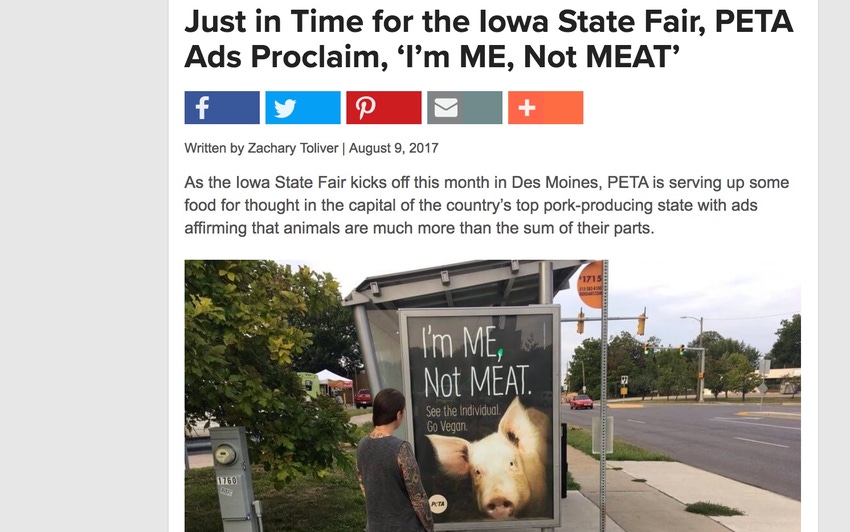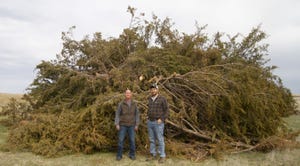PETA at Iowa State Fair; PLUS: Will meat substitutes finally go mainstream?
Millions of dollars are being invested in meat alternatives that taste like beef. Can it be achieved, and will consumers buy it?
August 15, 2017

Over the weekend, a Facebook friend posted a photo from the Iowa State Fair where a bus that took fairgoers from the parking lot to the fairgrounds had an advertisement on the side that read, “I’m me. Not meat. See the individual. Go vegan.”
The campaign on the bus was created by PETA, and it featured a sad looking pig that appeared to be staring deeply into the very souls of fairgoers. My guess is many might think twice about buying the corn dog on midway. I hate to admit it, but the slogan was catchy, provocative and well put together. If I wasn’t firmly on team meat, I might be disillusioned to equate an animal life to the life of a person and, ultimately, that’s the goal of the campaign.
The message feeds right into what the activists have been serving up for decades — guilt, fear, misinformation and a disingenuous mission of “trying to save the animals” while they line their own bank accounts. This rhetoric, combined with inaccurate, biased information coming from the Dietary Guidelines for Americans, has resulted in Americans eating far fewer meat and dairy products while consuming a great deal of fruits and vegetables.
And where has that gotten us? According to investigative journalist Nina Teicholz, “Over the last 30 years, as rates of obesity and diabetes have risen sharply in the U.S., the consumption of animal foods has declined steeply: whole milk is down 79%; red meat by 28% and beef by 35%; eggs are down by 13% and animal fats are down by 27%.
Meanwhile, consumption of fruits is up by 35% and vegetables by 20%. All trends, therefore, point towards Americans shifting from an animal-based diet to a plant-based one, and this data contradict the idea that a continued shift towards plant-based foods will promote health.”
This information was derived from a January 2017 report released from the USDA Economic Research Service titled, “U.S. Trends in Food Availability and a Dietary Assessment of Loss-Adjusted Food Availability, 1970-2014,” by Jeanine Bentley. Read the report in its entirety here.
Sadly, Americans are dealing with the health and economic ramifications of higher incidences of cancer, heart disease, diabetes and other complications that stem from obesity. What’s more, instead of admitting their mistake, nutritionists are doubling down and pushing harder for Americans to consume a plant-based diet.
Don’t believe me? Just check out the millions of dollars being invested in meat alternatives. An article titled, “Can protein startups and their investors take on big cow?” Written by Joanna Glasner for Crunch Base, the article details the trials researchers have been going through in order to obtain a realistic meat substitute that actually tastes like meat!
Using ingredients like pea protein, bugs, soy heme and other vegetable-based products, researchers feel like they are getting close to finding a suitable substitute and they anticipate consumer trends will follow suit, with many demanding this “guilt-free” burger. But will consumers buy into it? These folks seem to think so.
Here is an excerpt from the article, “Much of the innovation in the fake meat sector is centered around figuring out whether vegetables can be mixed up or engineered to taste more like meat. Just as the soda industry spent decades optimizing non-caloric sweeteners, alternative protein entrepreneurs are racing to perfect the 100% vegetarian ‘artificial meatener.’”
Right or wrong, kudos to these folks for seizing on a market opportunity; however, I’m hoping public sentiment will change in the right direction where saturated fats and proteins of animal products are no longer demonized and are widely recognized as the health foods they really are.
Industry support is needed to achieve this goal, and if I could determine where a large portion of my checkoff dollars would be spent, it would be on balancing the rhetoric and training our next generation of doctors, nutritionists and healthcare providers to see beef as an important part of a healthy diet instead of something that should be avoided.
The opinions of Amanda Radke are not necessarily those of beefmagazine.com or Penton Agriculture.
About the Author(s)
You May Also Like


.png?width=300&auto=webp&quality=80&disable=upscale)


